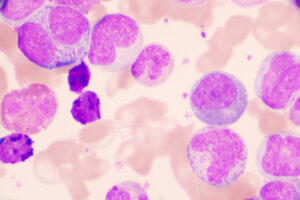Oncology
Chronic Lymphocytic Leukemia
Chronic Lymphocytic Leukemia: Perspectives on Early Intervention
Overview
The early treatment of asymptomatic patients with chronic lymphocytic leukemia (CLL) is of significant research interest but is difficult to study. This is, in part, because outcomes are very good with available therapy, without early treatment.
What is the status of early intervention for CLL as a research pursuit?
William G. Wierda, MD, PhD
|
|
“Survival is the most appropriate end point for clinical trials that are focused on early treatment, but this is going to be extremely difficult to study because patients are doing quite well with targeted therapy, without early treatment, and survival outcomes from such clinical trials will take many years to generate results.”
Survival is the most appropriate end point for clinical trials that are focused on early treatment, but this is going to be extremely difficult to study because patients are doing quite well with targeted therapy, without early treatment, and survival outcomes from such clinical trials will take many years to generate results. Event-free survival is not as meaningful as overall survival in this setting. Other end points, such as time to second treatment or time to third treatment, are complicated to include in studies, and these trials take years to complete because current treatments produce such long remissions with first-line therapy. So, I do not see approaching this as a practical exercise at this point. Early intervention will become relevant when we have curative therapy for a meaningful proportion of treated patients, because that is when we will be able to identify an end point, particularly for high-risk patients. At that time, we will be able to design clinical trials that include a justifiable end point that all involved can agree truly represents meaningful clinical benefit to the population.
Now, I think that we should investigate immune recovery and restoration, as immune restoration following CLL treatment may be an interesting end point, including for patients in the “watch-and-wait” phase of their CLL. We currently do not routinely see the correction of hypogammaglobulinemia with combined targeted therapy in our frontline trials, in which most patients are achieving minimal residual disease remission, so I am extremely interested in clinical trials evaluating strategies of immune reconstitution, with the expectation that such effective treatments will result in a decreased risk and incidence of infection and second malignancies in patients with CLL.
Susan O’Brien, MD
|
|
“Currently, there is no indication for early intervention, even in those with 17p deletion; many of these patients will not require therapy for years. Thus, until we have survival data from randomized studies, we should not be using early intervention outside of clinical trials.”
Evaluating early therapy is challenging because it is difficult to identify appropriate patients for inclusion. One of the problems with including only high-risk patients is that this is a very small subset. We use the watch-and-wait approach in most of our patients at initial diagnosis, so it is difficult to power a trial with only a high-risk subset.
In the German CLL12 trial, the CLL scoring system was used for selecting patients, but any patient who was not considered to be low risk was randomized. Thus, both high-risk and intermediate-risk patients were included in the trial. We will see survival data, the most relevant end point, but it will take a long time.
Currently, there is no indication for early intervention, even in those with 17p deletion; many of these patients will not require therapy for years. Thus, until we have survival data from randomized studies, we should not be using early intervention outside of clinical trials.
SWOG is currently conducting the EVOLVE trial, which is evaluating the effect of early time-limited therapy with venetoclax plus obinutuzumab or delayed therapy with the same regimen in high-risk and very high-risk patients. This study differs from the CLL12 trial in that researchers are using the CLL International Prognostic Index as inclusion criteria and are only including those patients with high-risk and very high-risk disease. However, it will take years to get the results. In the meantime, the current standard of care does not include early intervention in any patient population.
Matthew S. Davids, MD, MMSc
|
|
“I am more optimistic about some of the newer early intervention trials in this space, such as the PreVent-ACaLL and EVOLVE trials.”
Early intervention is a challenging area, but the good news for patients with CLL is that those who are on watch and wait will usually do well for a long time. Early intervention studies are lengthy and take time to achieve results, so, historically, the focus has been on the higher-risk patients because if you include low-risk patients, it could take many years to see a difference.
One of the challenges is that some studies have used event-free survival as an end point. For example, the CLL12 trial showed at its first interim analysis that ibrutinib had a superior event-free survival over placebo; however, one of the events for the placebo group was the need for ibrutinib therapy. If you count treatment as an event, you do not know whether you are prolonging overall survival. Thus, until there is a proven benefit to subjecting patients to the risk of therapy, I would not advocate early treatment.
I am more optimistic about some of the newer early intervention trials in this space, such as the PreVent-ACaLL and EVOLVE trials. PreVent-ACaLL is looking at acalabrutinib plus venetoclax and, as Dr O’Brien noted, EVOLVE is looking at venetoclax plus obinutuzumab. I am excited about these studies because they are time limited and have overall survival as the primary end point. We will have to wait years for the results, and I do not predict it as being practice changing anytime soon, but, if we are able to eliminate high-risk clones early on in high-risk patients, that could be beneficial down the line.
References
ClinicalTrials.gov. Acalabrutinib and venetoclax treatment of newly diagnosed patients with CLL at high risk of infection or early treatment. Accessed September 29, 2021. https://clinicaltrials.gov/ct2/show/NCT03868722
ClinicalTrials.gov. Ibrutinib in previously untreated Binet stage A chronic lymphocytic leukemia with risk of disease progression (CLL12). Accessed September 29, 2021. https://clinicaltrials.gov/ct2/show/NCT02863718
ClinicalTrials.gov. Testing the effects of early treatment with venetoclax and obinutuzumab versus delayed treatment with venetoclax and obinutuzumab for newly diagnosed patients with high-risk chronic lymphocytic leukemia or small lymphocytic lymphoma who do not have symptoms, the EVOLVE CLL/SLL study. Accessed September 29, 2021. https://clinicaltrials.gov/ct2/show/NCT04269902
Cohen JA, Rossi FM, Zucchetto A, et al. A laboratory-based scoring system predicts early treatment in Rai 0 chronic lymphocytic leukemia. Haematologica. 2020;105(6):1613-1620. doi:10.3324/haematol.2019.228171
Langerbeins P, Bahlo J, Rhein C, et al. Ibrutinib versus placebo in patients with asymptomatic, treatment-NAÏVE early stage CLL: primary endpoint results of the phase 3 double-blind randomized CLL12 trial. Hematol Oncol. 2019;37:38-40. doi:10.1002/hon.7_2629
Muchtar E, Kay NE, Parikh SA. Early intervention in asymptomatic chronic lymphocytic leukemia. Clin Adv Hematol Oncol. 2021;19(2):92-103.












